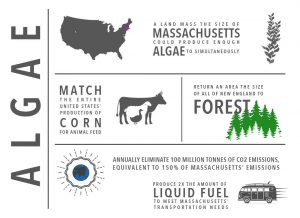
Bentley University research shows algae to hold potential to mitigate greenhouse gas emissions if used as a source of food or fuel. (PRNewsFoto/Bentley University)
New research has found that using microalgae to produce food and biofuel can help to reduce greenhouse gas emissions. The study was led by Michael J. Walsh, a research fellow in Bentley University’s Center for Integration of Science and Industry, and found that algal food and fuel coproduction can help to improve both land and water-use efficiency while reducing GHG emissions.
The project, conducted by researchers affiliated with the Marine Algal Industrialization Consortium, found that substitution of conventional crops with algae can substantially reduce the impact of current agricultural practices. These include:
- Avoiding deforestation and promoting afforestation
- Enabling emissions reductions from some of the hardest to mitigate emissions sources (deforestation and agriculture)
- Saving significant amounts of freshwater water by displacing water-hungry crops
- Enhancing food security by decoupling food production from at-risk agricultural regions
However, the study finds that using algae only for biofuel production will reduce GHG emissions but will not have the same ag offsetting benefits of producing food and fuel. “Thinking about algae as a food product opens new paths for achieving a number of sustainable development goals that are out of reach for algal biofuels,” said Walsh.
The research also looked at possible negative issues associated with using algae to produce food. One drawback, the study argues, is that algae requires a significant amount of unsustainable inputs of chemical fertilizers although this challenge could be offset by creating markets for carbon capture and nutrient recapture from waste water.
Walsh notes that if researchers can overcome these challenges we may see broader benefits. “Algae food holds the potential to open up a significant amount of land to other uses. With the benefit of available land, we can implement more emission reduction technologies such as bioenergy carbon capture and storage (BECCS),” he says. This matters because according to the 5th Assessment Report of the Intergovernmental Panel on Climate Change, if our ability to mitigate emissions through BECCS technology is limited, it’s likely many climate change models will not be able to limit warming to below 2 degrees Celsius (the known target for globally impactful temperature reduction).

